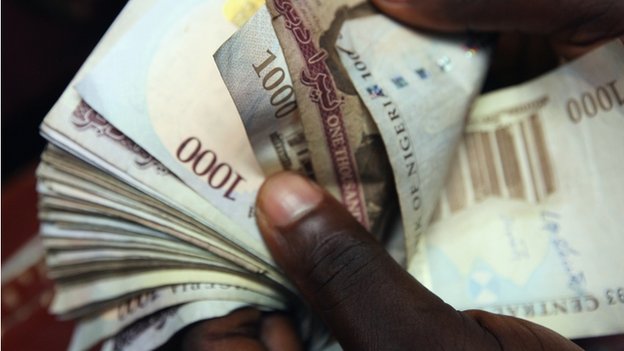The 20% fall in the Nigerian naira since September has not been as precipitous as the rouble’s total collapse, but the currency’s weakness is both an indicator of the West African country’s economic shortcomings, and a warning of things to come.
An economic rebasing in early 2014 showed that Nigerian economy is more diversified than previously thought, but there is no escaping the dominance of the oil sector.
Around 75% of all government revenues and 85% of its foreign exchange earnings come from hydrocarbons. It is oil funds that have been used by the Central Bank of Nigeria to defend the naira’s quasi-official peg to the dollar, meaning that the past month has been a baptism of fire for Godwin Emefiele, the bank’s new governor. The CBN’s attempt to bar commercial banks from hoarding dollars failed to lower demand, so the bank has intervened repeatedly.
That peg has buckled under the pressure of the global oil price shock. The naira is down from 162 to the dollar in August to 187.3 to the dollar today, having breached record lows at 187.3 in the afternoon. Foreign exchange reserves have been depleted by $4.1bn since the end of September; down to $35bn. HSBC’s sub-Saharan Africa economist David Faulkner thinks it is likely to fall further, down to 188 to the dollar by the end of the first quarter of 2015 before bottoming out at 195 in 2016. Standard Chartered ’s Razia Khan is only slightly more positive, forecasting a slight uptick to 185 in 2015 and back down to 192 in 2016.
Before he fell victim to Nigerian politics, Emefiele’s predecessor at the CBN, Lamido Sanusi, warned for years that there was only so much that he could do with monetary policy. Defending the naira with money from the “Excess Crude Account” has always given the sense of bailing out a boat without trying to fix the holes. Economic reform has come very slowly in Nigeria, which has used its liquidity to maintain unsustainable subsidies on imported processed goods in lieu of developing a diversified economy.
For the past few years, subsidies on fuel have consumed around 30% of the Federal budget. The country imports 1m metric tonnes of gasoline annually. Attempts to remove this crutch have been met with protest. Many consumers and small businesses depend on low-cost petrol, while corruption and feather-bedding mean that powerful elites have a huge financial stake in the status quo.
Nigeria’s tax base is tiny—tax revenues account for just 12% of GDP—and although some strides have been made in replacing food imports with local substitutes, the country is in serious need of reform. The writing has been on the wall for some time. Over the summer, the US almost entirely stopped importing crude from Nigeria, as the American shale gas boom reduced its reliance on imported hydrocarbons.
It is possible that the current collapse in oil prices will force the government’s hand. The allocation to gasoline subsidies has been halved in the 2015 budget—although, with a fall in the wholesale price of oil, it should cost the government less anyway.
The revised budget, released at the end of November, bases its projections on an oil price of $73 per barrel. Brent Crude is currently below $65.
Fixing the persistent weaknesses in the Nigerian economy would be hard enough, were there not an election looming in February 2015. The People’s Democratic Party has won every election since the return to democratic rule in 1999, and it is likely to win this one, but the cost of doing so has risen. An increasingly tense race, precipitated by attempts to split the party and a strong opposition candidate in Muhammadu Buhari, will mean that there will be expensive pre-election giveaways to state governors and promises to the public. It could be a long time before Nigeria’s political class are able to put a floor under the falling naira with action on reform, meaning that, for the medium term, the economy will remain hostage to oil prices.

